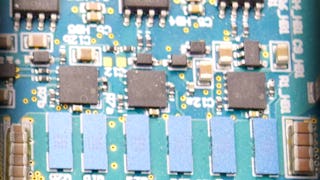- Browse
- Additive Manufacturing
Results for "additive manufacturing"
 Status: Free TrialFree TrialJ
Status: Free TrialFree TrialJJohns Hopkins University
Skills you'll gain: Mathematical Modeling, Graphing, Algebra, General Mathematics, Applied Mathematics, Arithmetic
4.8·Rating, 4.8 out of 5 stars194 reviewsBeginner · Course · 1 - 4 Weeks
 Status: PreviewPreviewU
Status: PreviewPreviewUUniversity of Illinois Urbana-Champaign
Skills you'll gain: Supply Chain Management, Supply Chain, Supply Chain Planning, Supply Management, Supplier Management, Materials Management, Risk Management, Risk Mitigation, Logistics Management, Logistics, Crisis Management, Supplier Relationship Management, Contingency Planning, Manufacturing Operations, Demand Planning, Case Studies, Personal protective equipment, Operational Efficiency, Capacity Management, Business Strategies
4.7·Rating, 4.7 out of 5 stars140 reviewsBeginner · Course · 1 - 4 Weeks
 Status: Free TrialFree TrialA
Status: Free TrialFree TrialAArizona State University
Skills you'll gain: Semiconductors, Electronics, Reliability, Electronic Components, Electronic Systems, Computer Hardware, Thermal Management, Engineering Design Process, Mechanical Design, Technology Roadmaps, Electrical Systems, Manufacturing Processes
4.7·Rating, 4.7 out of 5 stars154 reviewsMixed · Course · 1 - 3 Months
 Status: Free TrialFree TrialL
Status: Free TrialFree TrialLL&T EduTech
Skills you'll gain: Manufacturing Processes, Manufacturing Operations, Production Process, Manufacturing Standards, Safety Standards, Technical Standard, Materials science, Design Reviews, Failure Analysis, Thermal Management
4.9·Rating, 4.9 out of 5 stars10 reviewsIntermediate · Course · 1 - 4 Weeks
 Status: Free TrialFree TrialN
Status: Free TrialFree TrialNNational Taiwan University
Skills you'll gain: Architectural Drawing, Engineering Drawings, AutoCAD, Autodesk Revit, Building Information Modeling, SketchUp (3D Modeling Software), 3D Modeling, Drafting and Engineering Design, Blueprint Reading, Mechanical Drawings, Computer-Aided Design, Technical Drawing, Construction Estimating, Structural Engineering, Building Design, Engineering Design Process, Architectural Engineering, Visualization (Computer Graphics), Civil and Architectural Engineering, Engineering Management
4.7·Rating, 4.7 out of 5 stars358 reviewsBeginner · Specialization · 3 - 6 Months
 Status: Free TrialFree TrialU
Status: Free TrialFree TrialUUniversity of Colorado Boulder
Skills you'll gain: Power Electronics, Electronic Systems, Control Systems, Electrical Engineering, electromagnetics, Electronics Engineering, Electric Power Systems, Electronics, Electrical Power, Engineering Analysis, Simulations, Simulation and Simulation Software, Mathematical Modeling, Systems Analysis, Computer-Aided Design, Matlab, Technical Design, Systems Design, Verification And Validation, Design Strategies
Build toward a degree
4.7·Rating, 4.7 out of 5 stars159 reviewsIntermediate · Specialization · 3 - 6 Months
 Status: NewNewStatus: Free TrialFree TrialK
Status: NewNewStatus: Free TrialFree TrialKKhalifa University
Skills you'll gain: Environment Health And Safety, Safety Training, Accident Prevention, Occupational Health, Safety Standards, Hazard Analysis, Legal Risk, Risk Management, Safety Audits, Regulatory Compliance
4.7·Rating, 4.7 out of 5 stars103 reviewsBeginner · Course · 1 - 4 Weeks
 U
UUniversidad de los Andes
Skills you'll gain: Arithmetic, Geometry, Mathematics Education, Systems Of Measurement, General Mathematics
4.9·Rating, 4.9 out of 5 stars352 reviewsBeginner · Course · 1 - 3 Months
 Status: Free TrialFree TrialU
Status: Free TrialFree TrialUUniversity of Colorado Boulder
Skills you'll gain: Statistical Inference, Statistical Modeling, Statistical Hypothesis Testing, Regression Analysis, R Programming, Data Ethics, Experimentation, Research Design, Statistical Methods, Data Science, Data Analysis, Statistical Analysis, Data Modeling, Predictive Modeling, Mathematical Modeling, Probability & Statistics, A/B Testing, Quantitative Research, Machine Learning, Model Evaluation
Build toward a degree
4.2·Rating, 4.2 out of 5 stars55 reviewsIntermediate · Specialization · 3 - 6 Months
 U
UUniversidad de los Andes
Skills you'll gain: Arithmetic, Mathematics Education, Geometry, Systems Of Measurement, Algebra
4.9·Rating, 4.9 out of 5 stars536 reviewsBeginner · Course · 1 - 3 Months
 Status: Free TrialFree Trial
Status: Free TrialFree TrialSkills you'll gain: Blockchain, Digital Assets, Financial Inclusion, Supply Chain, Governance, Supply Chain Management, Business Transformation, FinTech, Market Opportunities, Competitive Analysis, Interoperability, Business Analysis, Business Leadership, Strategic Partnership, Entrepreneurship, New Business Development, Emerging Technologies, Strategic Leadership, Case Studies, Leadership
4.7·Rating, 4.7 out of 5 stars72 reviewsBeginner · Specialization · 3 - 6 Months
 Status: Free TrialFree TrialI
Status: Free TrialFree TrialIImperial College London
Skills you'll gain: Immunology, Infectious Diseases, Molecular Biology, Epidemiology, Microbiology, Public Health, Drug Development, Biotechnology, Medical Science and Research, Climate Change Programs, Cell Biology, Health Disparities, Biology, Clinical Trials, Laboratory Research, Pharmacology, Public Health and Disease Prevention, New Product Development, Emerging Technologies, Manufacturing Processes
4.9·Rating, 4.9 out of 5 stars87 reviewsIntermediate · Specialization · 3 - 6 Months
Searches related to additive manufacturing
In summary, here are 10 of our most popular additive manufacturing courses
- Algebra: Elementary to Advanced - Functions & Applications: Johns Hopkins University
- Managing Supply Chain Disruption During COVID-19: University of Illinois Urbana-Champaign
- Introduction to Semiconductor Packaging: Arizona State University
- Foundations in Heavy Industry Production: L&T EduTech
- CAD/BIM技術與應用: National Taiwan University
- Modeling and Control of Power Electronics: University of Colorado Boulder
- Introduction to HSE Engineering: Khalifa University
- Enseñanza de las matemáticas de primaria: Universidad de los Andes
- Statistical Modeling for Data Science Applications: University of Colorado Boulder
- Aprendizaje de las matemáticas de primaria: Universidad de los Andes










